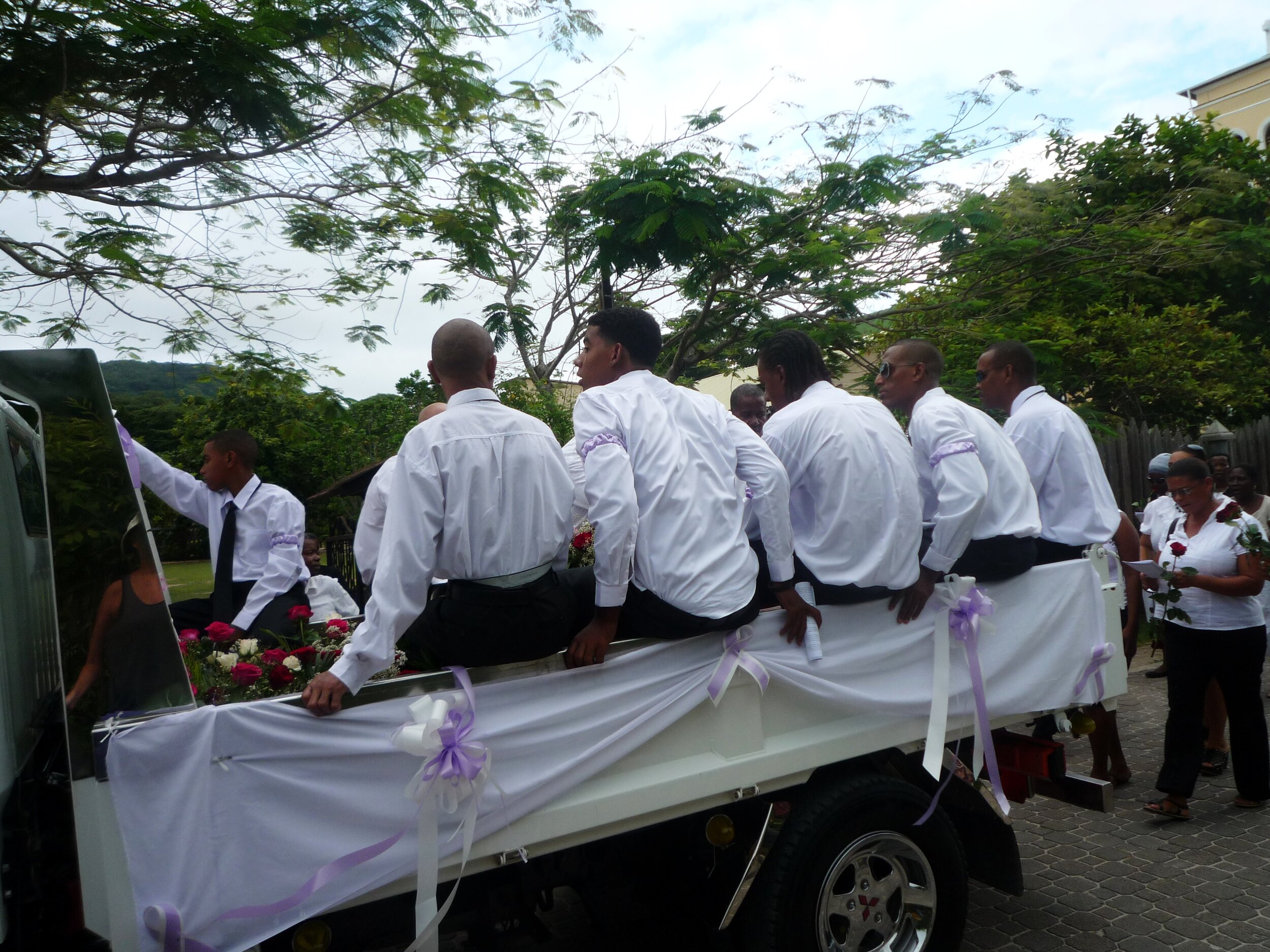Paradise, Boredom and Camels
I was mucking around in paradise a couple of weeks back, swilling on the Divine, when it occurred to me that so much beauty might actually get boring - after a while. I wondered how long it would take before the curved lines of coconut palms would weary my eyes; or whether I would become blasé about the graceful way they tendered their emerald fronds towards bleached coral shorelines and aquamarine waters. How long before my body tired of bobbing around in a warm sea mesmerized by the swaying rainbow of tropical fish? And would those cute little turtle doves that invited themselves to the breakfast table every morning eventually become pesky blighters requiring a short shrift?As luck would have it, I was only passing through paradise so the likelihood that I would develop a craving for the overcrowded, polluted spaces of regular urban life was probably limited. Still, the contrast with the dull grey tones of life in a Europe beset with indecision, crisis and winter was so startlingly spectacular that I felt more or less obliged to give some thought to what life would be like in an ongoing paradise.  We all know our species was cast out of paradise once it recognized where it was and knew the difference between black and white. Even in evolutionary terms we know it took a bit longer than a kick in the butt for the brain to grow to its current complex capacity for differentiation. My brain was only exposed to the lures of paradise for 10 days -just long enough to entertain the idea that sheer boredom with unmitigated beauty may have caused our species to foul its paradisiacal nest. I read somewhere that it is harder for a rich man to enter heaven than it is for a camel to go through the eye of a needle. Luckily I know more about sewing than most blokes and wouldn’t dream of trying to squeeze a camel through a needle. But camels aside, could one, once through the eye, take French leave if one were bored to death? As if to answer these idle questions that only the “rich” can afford to ask themselves, the Universe, in one of her playful moods, showed me the dissent and distress that lies within the fabric of daily life even in paradise.They both looked like they were in their 50s. We watched them begin their slow barefoot procession through the palms, along an
We all know our species was cast out of paradise once it recognized where it was and knew the difference between black and white. Even in evolutionary terms we know it took a bit longer than a kick in the butt for the brain to grow to its current complex capacity for differentiation. My brain was only exposed to the lures of paradise for 10 days -just long enough to entertain the idea that sheer boredom with unmitigated beauty may have caused our species to foul its paradisiacal nest. I read somewhere that it is harder for a rich man to enter heaven than it is for a camel to go through the eye of a needle. Luckily I know more about sewing than most blokes and wouldn’t dream of trying to squeeze a camel through a needle. But camels aside, could one, once through the eye, take French leave if one were bored to death? As if to answer these idle questions that only the “rich” can afford to ask themselves, the Universe, in one of her playful moods, showed me the dissent and distress that lies within the fabric of daily life even in paradise.They both looked like they were in their 50s. We watched them begin their slow barefoot procession through the palms, along an  idyllic shoreline to a canopy specially prepared for them between giant granite rocks worn into shape over 650 million years. The canopy was adorned with red hibiscus flowers and frangipani blooms were scattered liberally on the ground. Two high backed cane chairs had been arranged so that the couple would have their backs to the sea when they exchanged their vows. They were married far from the eyes of their respective cultures and only the smiles of the local women, paid to manage such events, blessed their union. That evening we caught sight of the newlyweds arriving in the restaurant for their nuptial feast. She slashed the air with violent staccato movements of her arms while he stood meekly alongside her demands. The waiter had a slight stoop of the sort you find in India when one caste is dealing with the power of another. I imagined disappointment was angering her. Paradise was neither conforming to her expectations nor to what she had paid for. One millimeter short of the mark is enough to prove that the camels of the rich and the romantic have difficulty getting into heaven.
idyllic shoreline to a canopy specially prepared for them between giant granite rocks worn into shape over 650 million years. The canopy was adorned with red hibiscus flowers and frangipani blooms were scattered liberally on the ground. Two high backed cane chairs had been arranged so that the couple would have their backs to the sea when they exchanged their vows. They were married far from the eyes of their respective cultures and only the smiles of the local women, paid to manage such events, blessed their union. That evening we caught sight of the newlyweds arriving in the restaurant for their nuptial feast. She slashed the air with violent staccato movements of her arms while he stood meekly alongside her demands. The waiter had a slight stoop of the sort you find in India when one caste is dealing with the power of another. I imagined disappointment was angering her. Paradise was neither conforming to her expectations nor to what she had paid for. One millimeter short of the mark is enough to prove that the camels of the rich and the romantic have difficulty getting into heaven. That same day in the afternoon we were cycling back through one of the island villages, when we were stopped short in our tracks by the silence of a very large gathering of local people outside a wooden church. A truck, parked close to the church steps, was decorated in white satin. The young man in dreadlocks and clean white shirt standing beside me told me in hushed tones that she was only 45. It was breast cancer. She had gone away to get treatment but it hadn’t worked. Her husband had died in an accident two years previously. She only had one boy. The whole community was here today. She was the local school teacher. The young man said several times, as if searching for the right words, that she wasn’t an unkind woman. I whispered back that I’d never imagined cancer to be a part of paradise. He smiled sadly. The hymns rose and fell in French and English until the coffin was removed from the church and laid in the back of the truck. The men of the family clad in white climbed up to sit with it as it began its journey towards the graveyard. The women formed a cortege behind the truck, chanting prayers as tropical rain drowned the remnants of the afternoon. It failed to interrupt neither the dignity of their mourning nor the pace of their communal step.And despite these two gentle reminders of the frailty of human life and relationships even in paradise it was as if these ten days had slipped through the eye of the needle and God had welcomed us back. And from there, the poverty of our rich lives and the utter boredom of our endless economic and social crisis stood out like a herd of camels on Champs Elysees.Tell me something about any close brush you have had with paradise in recent years.Meanwhile keep your spirits up while the rain comes downLynne
That same day in the afternoon we were cycling back through one of the island villages, when we were stopped short in our tracks by the silence of a very large gathering of local people outside a wooden church. A truck, parked close to the church steps, was decorated in white satin. The young man in dreadlocks and clean white shirt standing beside me told me in hushed tones that she was only 45. It was breast cancer. She had gone away to get treatment but it hadn’t worked. Her husband had died in an accident two years previously. She only had one boy. The whole community was here today. She was the local school teacher. The young man said several times, as if searching for the right words, that she wasn’t an unkind woman. I whispered back that I’d never imagined cancer to be a part of paradise. He smiled sadly. The hymns rose and fell in French and English until the coffin was removed from the church and laid in the back of the truck. The men of the family clad in white climbed up to sit with it as it began its journey towards the graveyard. The women formed a cortege behind the truck, chanting prayers as tropical rain drowned the remnants of the afternoon. It failed to interrupt neither the dignity of their mourning nor the pace of their communal step.And despite these two gentle reminders of the frailty of human life and relationships even in paradise it was as if these ten days had slipped through the eye of the needle and God had welcomed us back. And from there, the poverty of our rich lives and the utter boredom of our endless economic and social crisis stood out like a herd of camels on Champs Elysees.Tell me something about any close brush you have had with paradise in recent years.Meanwhile keep your spirits up while the rain comes downLynne
